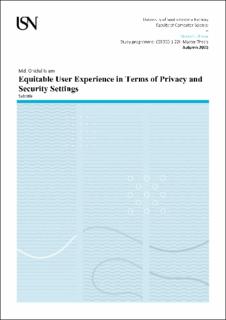Equitable User Experience in Terms of Privacy and Security Settings
Master thesis

Permanent lenke
https://hdl.handle.net/11250/3107669Utgivelsesdato
2023Metadata
Vis full innførselSamlinger
Sammendrag
This thesis addresses the common cybersecurity challenge of promoting user use of security techniques and tools, including encryption software, password guidelines, privacy settings, and phishing detection processes. The difficulty lies in the time and energy consumption connected with these processes, often posing limitations to user compliance. Moreover, users with lowered cognitive abilities face additional challenges in using such tools, leading to inclusion issues. To tackle these problems,the research focuses on creating equal availability to web services without harming privacy. The primary goals include developing rules for inclusive website design, proposing user-friendly privacy and security steps, identifying requirements for lower cognitive users, and monitoring the evolution of existing public service websites. The methodology involves a complete literature review, data collection through surveys and interviews, and a detailed analysis of websites’ availability and usability.
The findings contribute practical recommendations for designing inclusive web services and promoting better cybersecurity practices while considering users’ needs with permanently or temporarily lowered cognitive ability.